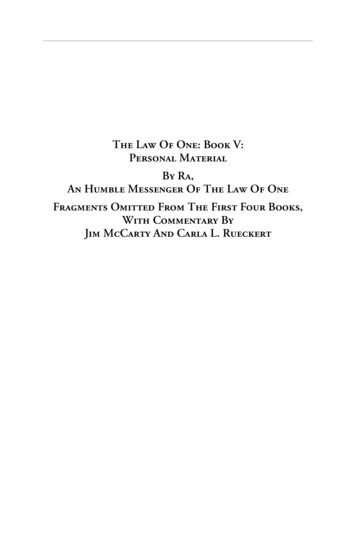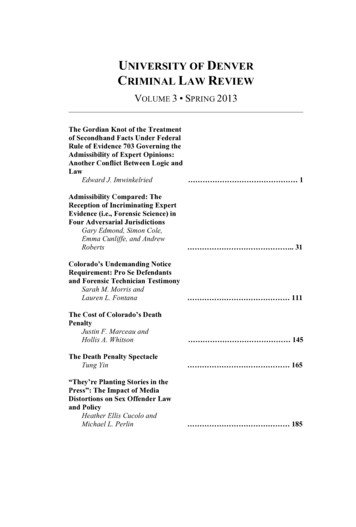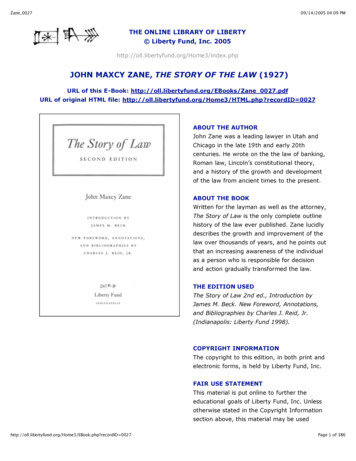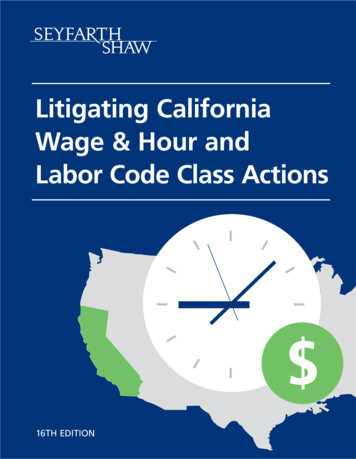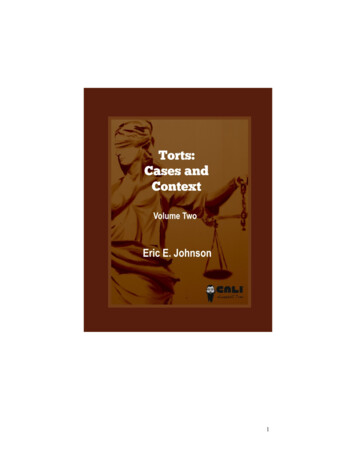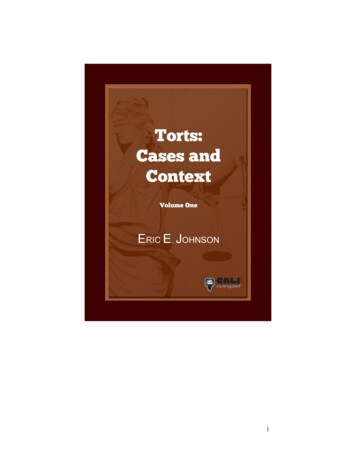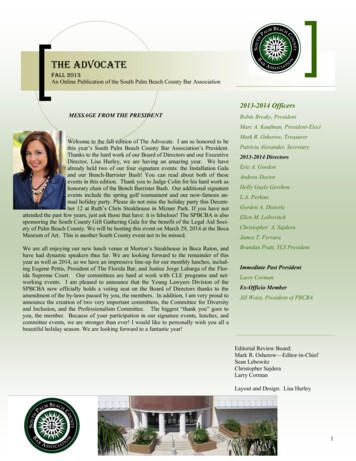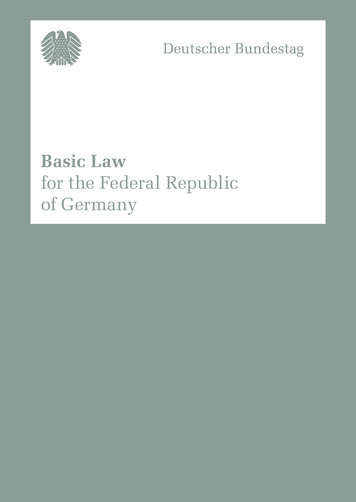
Transcription
Basic Lawfor the Federal Republicof Germany
Basic Lawfor the Federal Republicof Germany23 May 1949Last amended on 29 September 2020
Translated by: Professor Christian Tomuschat, Professor David P. Currie,Professor Donald P. Kommers and Raymond Kerr, in cooperation with theLanguage Service of the German Bundestag
Contents
PreambleI. Basic Art.Art.Art.Art.Art.Art.Art.Art.Art.Art.Art.1 [Human dignity – Human rights – Legally binding forceof basic rights]2 [Personal freedoms]3 [Equality before the law]4 [Freedom of faith and conscience]5 [Freedom of expression, arts and sciences]6 [Marriage – Family – Children]7 [School system]8 [Freedom of assembly]9 [Freedom of association]10 [Privacy of correspondence, posts and telecommunications]11 [Freedom of movement]12 [Occupational freedom]12a [Compulsory military and alternative civilian service]13 [Inviolability of the home]14 [Property – Inheritance – Expropriation]15 [Nationalisation]16 [Citizenship – Extradition]16a [Right of asylum]17 [Right of petition]17a [Restriction of basic rights in specific instances]18 [Forfeiture of basic rights]19 [Restriction of basic rights – Legal 151515161617171818191919212222232324242525II. The Federation and the Länder26[Constitutional principles – Right of resistance][Protection of the natural foundations of life and animals][Political parties][Federal capital ‒ Federal flag][European Union – Protection of basic rights – Principleof subsidiarity][Transfer of sovereign powers – System of collective security][Primacy of international law][Securing international peace][Merchant fleet][Land constitutions – Autonomy of municipalities][New delimitation of the federal territory][Sovereign powers of the Länder][Supremacy of federal law][Foreign relations]2727272828303031313132343434
Art. 33 [Equal citizenship – Public service]Art. 34 [Liability for violation of official duty]Art. 35 [Legal and administrative assistance and assistanceduring disasters]Art. 36 [Personnel of federal authorities]Art. 37 [Federal 36III. The Bundestag37[Elections][Electoral term – Convening][Presidency – Rules of procedure][Scrutiny of elections][Public sittings – Majority decisions][Right to require presence, right of access and right to be heard][Committees of inquiry][Committee on the European Union][Committees on Foreign Affairs and Defence][Parliamentary Commissioner for the Armed Forces][Petitions Committee]Parliamentary Oversight Panel[Immunities of Members][Right of refusal to give evidence][Candidature – Protection of membership – 14342IV. The Bundesrat43[Functions][Composition – Weighted voting][President – Decisions – Rules of procedure][Attendance of members of the Federal Government]44444445IVa. The Joint Committee46Art. 53a [Composition – Rules of procedure]Art.Art.Art.Art.Art.Art.343547V. The Federal President48[Election ‒ Term of office][Incompatibilities][Oath of nal representation of the Federation]494950505050
Art. 59a (repealed)Art. 60 [Appointment of civil servants – Pardon – Immunity]Art. 61 [Impeachment before the Federal Constitutional 182515151VI. The Federal Government52[Composition][Election of the Federal Chancellor][Appointment and dismissal of Federal Ministers ‒ Oath of office][Power to determine policy guidelines – Department andcollegiate responsibility][Command of the Armed Forces][Incompatibilities][Vote of no confidence][Vote of confidence][Deputy Federal Chancellor ‒ Term of office]535353VII. Federal Legislation and Legislative Procedures56[Division of powers between the Federation and the Länder][Exclusive legislative power of the Federation][Concurrent legislative powers][Matters under exclusive legislative power of the Federation][Matters under concurrent legislative powers](repealed)(repealed)[Bills][Legislative procedure – Mediation Committee][Passage of federal laws][Amendment of the Basic Law][Issuance of statutory instruments][State of tension][Legislative emergency][Certification ‒ Promulgation ‒ Entry into II. The Execution of Federal Laws and the .83 [Execution by the Länder]84 [Länder administration – Federal oversight]85 [Execution by the Länder on federal commission]86 [Federal administration]87 [Matters]87a [Armed Forces]87b [Federal Defence Administration]70707172727373
t.87c [Production and utilisation of nuclear energy]87d [Air transport administration]87e [Rail transport administration]87f [Posts and telecommunications]88 [The Federal Bank – The European Central Bank]89 [Federal waterways – Administration of waterways]90 [Federal roads and motorways]91 [Internal emergency]91a91b91c91d91eArt. 92Art. 93Art. 94Art. 95Art. 96Art. 97Art. 98Art. 99Art. 100Art. 101Art. 102Art. 103Art. 1047474757676767778VIIIa. Joint Tasks79[Joint tasks – Responsibility for expenditure][Education programmes and promotion of research][Information technology systems][Comparison of performance][Cooperation in respect of basic support for personsseeking employment]80808182IX. The Judiciary83[Court organisation][Jurisdiction of the Federal Constitutional Court][Composition of the Federal Constitutional Court][Supreme federal courts][Other federal courts][Judicial independence][Legal status of judges – Impeachment][Constitutional disputes within a Land][Concrete judicial review][Ban on extraordinary courts][Abolition of capital punishment][Fair trial][Deprivation of liberty]84848586868787888889898989X. Finance91Art. 104a [Apportionment of expenditures – Financial system – Liability]Art. 104b [Financial assistance for investments]Art. 104c [Financial assistance for investments in municipal educationinfrastructure]Art. 104d [Financial assistance for investments in social housing]Art. 105 [Distribution of powers regarding tax laws]Art. 106 [Apportionment of tax revenue and yield of fiscal monopolies]Art. 106a [Federal grants for local public transport]Art. 106b [Länder share of motor vehicle tax]829293949495959999
Art. 107 [Distribution of tax revenue – Financial equalisation amongthe Länder – Supplementary grants]Art. 108 [Financial administration of the Federation and the Länder –Financial courts]Art. 109 [Budget management in the Federation and the Länder]Art. 109a [Budgetary emergencies]Art. 110 [Federal budget]Art. 111 [Interim budget management]Art. 112 [Extrabudgetary expenditures]Art. 113 [Increase of expenditures]Art. 114 [Submission and auditing of accounts]Art. 115 [Limits of borrowing]99100102103104104105105106106Xa. State of Defence108[Declaration of a state of defence][Power of command of the Federal Chancellor][Extension of the legislative powers of the Federation][Urgent bills][Joint Committee][Use of Federal Border Police – Extended powers of instruction][Federal Constitutional Court][Expiry of electoral terms and terms of office][Powers of the Land governments][Rank and duration of emergency provisions][Repeal of emergency measures – Conclusion of peace]109110110111111112112112113113114XI. Transitional and Concluding Provisions115[Definition of “German” ‒ Restoration of citizenship][Suspended entry into force of two basic rights][New delimitation of Baden and Württemberg][New delimitation of Berlin and Brandenburg][Refugees and expellees][Occupation costs – Burdens resulting from the war][Equalisation of burdens][Definition of “majority of the members”][Date of transmission of legislative powers][Continued applicability of pre-existing law][Continued applicability of law within the scope of exclusivelegislative power]Art. 125 [Continued applicability of law within the scope of concurrentlegislative power]Art. 125a [Continued applicability of federal law – Replacementby Land law]116116116117117117118118118119Art. 115aArt. 115bArt. 115cArt. 115dArt. 115eArt. 115fArt. 115gArt. 115hArt. 115iArt. 115kArt. 115lArt. 116Art. 117Art. 118Art. 118aArt. 119Art. 120Art. 120aArt. 121Art. 122Art. 123Art. 124119119120
Art. 125b [Continued applicability of framework laws – Deviation powerof the Länder]Art. 125c [Continued applicability of law within the scope of joint tasks]Art. 126 [Determination about continued applicability of lawas federal law]Art. 127 [Extension of law to the French zone and to Berlin]Art. 128 [Continued authority to issue instructions]Art. 129 [Continued authority to issue legal acts]Art. 130 [Transfer of existing administrative institutions]Art. 131 [Persons formerly in the public service]Art. 132 [Retirement of civil servants]Art. 133 [Succession to the Administration of the Combined Economic Area]Art. 134 [Succession to Reich assets]Art. 135 [Assets in case of territorial changes between the Länder]Art. 135a [Old debts]Art. 136 [First convening of the Bundesrat]Art. 137 [Right of state employees to stand for election]Art. 138 [South German notaries]Art. 139 [Continued applicability of denazification provisions]Art. 140 [Law of religious denominations]Art. 141 [“Bremen Clause”]Art. 142 [Reservation in favour of basic rights in Land constitutions]Art. 142a (repealed)Art. 143 [Duration of derogations from the Basic Law]Art. 143a [Exclusive legislative power concerning federal railways]Art. 143b [Transformation of the Deutsche Bundespost]Art. 143c [Compensation for the cessation of joint tasks]Art. 143d [Transitional provisions relating to consolidation assistance]Art. 143e [Federal motorways, transformation of commissionedadministration]Art. 143f [Financial relations within the federal system of government]Art. 143g [Continued applicability of Article 107]Art. 144 [Ratification of the Basic Law]Art. 145 [Entry into force of the Basic Law]Art. 146 [Duration of the Basic Extracts from the German Constitutionof 11 August 1919Art. 136Art. 137Art. 138Art. 139Art. 141(Weimar Constitution)136Religion and religious societies137137137138138138
Basic Lawfor the FederalRepublic of Germany23 May 1949The Parliamentary Council, meeting in public session at Bonnam Rhein on 23 May 1949, confirmed that the Basic Law forthe Federal Republic of Germany, which was adopted by theParliamentary Council on 8 May 1949, was ratified in the weekof 16 to 22 May 1949 by the parliaments of more than two thirdsof the participating German Länder.By virtue of this fact the Parliamentary Council, represented byits Presidents, has signed and promulgated the Basic Law.The Basic Law is hereby published in the Federal Law Gazettepursuant to paragraph (3) of Article 145.
PreambleConscious of their responsibility before God and man,Inspired by the determination to promote world peace as anequal partner in a united Europe, the German people, in theexercise of their constituent power, have adopted this Basic Law.Germans in the Länder of Baden-Württemberg, Bavaria, Berlin, Brandenburg, Bremen, Hamburg, Hesse, Lower Saxony,Mecklenburg-Western Pomerania, North Rhine-Westphalia,Rhineland-Palatinate, Saarland, Saxony, Saxony-Anhalt,Schleswig-Holstein and Thuringia have achieved the unity andfreedom of Germany in free self-determination. This Basic Lawthus applies to the entire German people.13
I.Basic Rights14
Article 1[Human dignity – Human rights – Legally binding forceof basic rights](1) Human dignity shall be inviolable. To respect and protectit shall be the duty of all state authority.(2) The German people therefore acknowledge inviolable andinalienable human rights as the basis of every community,of peace and of justice in the world.(3) The following basic rights shall bind the legislature, theexecutive and the judiciary as directly applicable law.Article 2[Personal freedoms](1) Every person shall have the right to free development of hispersonality insofar as he does not violate the rights of others or offend against the constitutional order or the morallaw.(2) Every person shall have the right to life and physicalintegrity. Freedom of the person shall be inviolable. Theserights may be interfered with only pursuant to a law.Article 3[Equality before the law](1) All persons shall be equal before the law.(2) Men and women shall have equal rights. The state shallpromote the actual implementation of equal rights for women and men and take steps to eliminate disadvantages thatnow exist.(3) No person shall be favoured or disfavoured because of sex,parentage, race, language, homeland and origin, faith orreligious or political opinions. No person shall be disfavoured because of disability.Article 4[Freedom of faith and conscience](1) Freedom of faith and of conscience and freedom to professa religious or philosophical creed shall be inviolable.I. Basic Rights15
(2) The undisturbed practice of religion shall be guaranteed.(3) No person shall be compelled against his conscience torender military service involving the use of arms. Detailsshall be regulated by a federal law.Article 5[Freedom of expression, arts and sciences](1) Every person shall have the right freely to express anddisseminate his opinions in speech, writing and picturesand to inform himself without hindrance from generallyaccessible sources. Freedom of the press and freedom ofreporting by means of broadcasts and films shall be guaranteed. There shall be no censorship.(2) These rights shall find their limits in the provisions ofgeneral laws, in provisions for the protection of youngpersons and in the right to personal honour.(3) Arts and sciences, research and teaching shall be free.The freedom of teaching shall not release any person fromallegiance to the constitution.(1)(2)(3)(4)(5)Article 6[Marriage – Family – Children]Marriage and the family shall enjoy the special protectionof the state.The care and upbringing of children is the natural right ofparents and a duty primarily incumbent upon them. Thestate shall watch over them in the performance of this duty.Children may be separated from their families against thewill of their parents or guardians only pursuant to a lawand only if the parents or guardians fail in their duties orthe children are otherwise in danger of serious neglect.Every mother shall be entitled to the protection and careof the community.Children born outside of marriage shall be provided bylegislation with the same opportunities for physical andmental development and for their position in society asare enjoyed by those born within marriage.I. Basic Rights16
(1)(2)(3)(4)(5)(6)Article 7[School system]The entire school system shall be under the supervisionof the state.Parents and guardians shall have the right to decidewhether children shall receive religious instruction.Religious instruction shall form part of the regular curriculum in state schools, with the exception of non-denominational schools. Without prejudice to the state’sright of supervision, religious instruction shall be givenin accordance with the tenets of the religious communityconcerned. Teachers may not be obliged against their willto give religious instruction.The right to establish private schools shall be guaranteed.Private schools that serve as alternatives to state schoolsshall require the approval of the state and shall be subjectto the laws of the Länder. Such approval shall be givenwhen private schools are not inferior to the state schoolsin terms of their educational aims, their facilities or theprofessional training of their teaching staff and when segregation of pupils according to the means of their parents willnot be encouraged thereby. Approval shall be withheld ifthe economic and legal position of the teaching staff is notadequately assured.A private elementary school shall be approved only ifthe education authority finds that it serves a specialeducational interest or if, on the application of parentsor guardians, it is to be established as a denominationalor interdenominational school or as a school based on aparticular philosophy and no state elementary school ofthat type exists in the municipality.Preparatory schools shall remain abolished.Article 8[Freedom of assembly](1) All Germans shall have the right to assemble peacefullyand unarmed without prior notification or permission.I. Basic Rights17
(2) In the case of outdoor assemblies, this right may be restricted by or pursuant to a law.Article 9[Freedom of association](1) All Germans shall have the right to form societies and otherassociations.(2) Associations whose aims or activities contravene thecriminal laws or that are directed against the constitutionalorder or the concept of international understanding shall beprohibited.(3) The right to form associations to safeguard and improveworking and economic conditions shall be guaranteed toevery individual and to every occupation or profession.Agreements that restrict or seek to impair this right shallbe null and void; measures directed to this end shall beunlawful. Measures taken pursuant to Article 12a, to paragraphs (2) and (3) of Article 35, to paragraph (4) of Article87a or to Article 91 may not be directed against industrialdisputes engaged in by associations within the meaning ofthe first sentence of this paragraph in order to safeguardand improve working and economic conditions.Article 10[Privacy of correspondence, posts andtelecommunications](1) The privacy of correspondence, posts and telecommunications shall be inviolable.(2) Restrictions may be ordered only pursuant to a law. If therestriction serves to protect the free democratic basic orderor the existence or security of the Federation or of a Land,the law may provide that the person affected shall not beinformed of the restriction and that recourse to the courtsshall be replaced by a review of the case by agencies andauxiliary agencies appointed by the legislature.I. Basic Rights18
Article 11[Freedom of movement](1) All Germans shall have the right to move freely throughoutthe federal territory.(2) This right may be restricted only by or pursuant to a law,and only in cases in which the absence of adequate meansof support would result in a particular burden for the community, or in which such restriction is necessary to avertan imminent danger to the existence or the free democraticbasic order of the Federation or of a Land, to combat thedanger of an epidemic, to respond to a grave accident ornatural disaster, to protect young persons from seriousneglect or to prevent crime.Article 12[Occupational freedom](1) All Germans shall have the right freely to choose theiroccupation or profession, their place of work and theirplace of training. The practice of an occupation or profession may be regulated by or pursuant to a law.(2) No person may be required to perform work of a particularkind except within the framework of a traditional duty ofcommunity service that applies generally and equally to all.(3) Forced labour may be imposed only on persons deprived oftheir liberty by the judgment of a court.Article 12a[Compulsory military and alternative civilian service](1) Men who have attained the age of eighteen may be requiredto serve in the Armed Forces, in the Federal Border Police,or in a civil defence organisation.(2) Any person who, on grounds of conscience, refuses torender military service involving the use of arms may berequired to perform alternative service. The duration ofalternative service shall not exceed that of military service.Details shall be regulated by a law, which shall not interferewith the freedom to make a decision in accordance with theI. Basic Rights19
(3)(4)(5)(6)dictates of conscience and which shall also provide for thepossibility of alternative service not connected with unitsof the Armed Forces or of the Federal Border Police.Persons liable to compulsory military service who are notcalled upon to render service pursuant to paragraph (1) or(2) of this Article may, when a state of defence is in effect,be assigned by or pursuant to a law to employment involving civilian services for defence purposes, including theprotection of the civilian population; they may be assignedto public employment only for the purpose of discharging police functions or such other sovereign functions ofpublic administration as can be discharged only by personsemployed in the public service. The employment contemplated by the first sentence of this paragraph may includeservices within the Armed Forces, in the provision ofmilitary supplies or with public administrative authorities;assignments to employment connected with supplying andservicing the civilian population shall be permissible onlyto meet their basic requirements or to guarantee their safety.If, during a state of defence, the need for civilian services inthe civilian health system or in stationary military hospitalscannot be met on a voluntary basis, women between the ageof eighteen and fifty-five may be called upon to render suchservices by or pursuant to a law. Under no circumstancesmay they be required to render service involving the use ofarms.Prior to the existence of a state of defence, assignmentsunder paragraph (3) of this Article may be made only ifthe requirements of paragraph (1) of Article 80a are met.In preparation for the provision of services under paragraph (3) of this Article that demand special knowledge orskills, participation in training courses may be required byor pursuant to a law. In this case the first sentence of thisparagraph shall not apply.If, during a state of defence, the need for workers in theareas specified in the second sentence of paragraph (3) ofthis Article cannot be met on a voluntary basis, the rightI. Basic Rights20
of German citizens to abandon their occupation or place ofemployment may be restricted by or pursuant to a law inorder to meet this need. Prior to the existence of a state ofdefence, the first sentence of paragraph (5) of this Articleshall apply, mutatis mutandis.(1)(2)(3)(4)(5)Article 13[Inviolability of the home]The home is inviolable.Searches may be authorised only by a judge or, when timeis of the essence, by other authorities designated by thelaws and may be carried out only in the manner thereinprescribed.If particular facts justify the suspicion that any person hascommitted an especially serious crime specifically defined bya law, technical means of acoustical surveillance of any homein which the suspect is supposedly staying may be employedpursuant to judicial order for the purpose of prosecuting theoffence, provided that alternative methods of investigatingthe matter would be disproportionately difficult or unproductive. The authorisation shall be for a limited time. The ordershall be issued by a panel composed of three judges. Whentime is of the essence, it may also be issued by a single judge.To avert acute dangers to public safety, especially dangersto life or to the public, technical means of surveillance ofthe home may be employed only pursuant to judicial order.When time is of the essence, such measures may also beordered by other authorities designated by a law; a judicialdecision shall subsequently be obtained without delay.If technical means are contemplated solely for the protection of persons officially deployed in a home, the measuremay be ordered by an authority designated by a law. Theinformation thereby obtained may be otherwise used onlyfor purposes of criminal prosecution or to avert danger andonly if the legality of the measure has been previously determined by a judge; when time is of the essence, a judicialdecision shall subsequently be obtained without delay.I. Basic Rights21
(6) The Federal Government shall report to the Bundestag annually as to the employment of technical means pursuant toparagraph (3) and, within the jurisdiction of the Federation,pursuant to paragraph (4) and, insofar as judicial approvalis required, pursuant to paragraph (5) of this Article. Apanel elected by the Bundestag shall exercise parliamentaryoversight on the basis of this report. A comparable parliamentary oversight shall be afforded by the Länder.(7) Interferences and restrictions shall otherwise only bepermissible to avert a danger to the public or to the life ofan individual or, pursuant to a law, to confront an acutedanger to public safety and order, in particular to relievean accommodation shortage, to combat the danger of anepidemic or to protect young persons at risk.Article 14[Property – Inheritance – Expropriation](1) Property and the right of inheritance shall be guaranteed.Their content and limits shall be defined by the laws.(2) Property entails obligations. Its use shall also serve thepublic good.(3) Expropriation shall only be permissible for the public good.It may only be ordered by or pursuant to a law that determines the nature and extent of compensation. Such compensation shall be determined by establishing an equitablebalance between the public interest and the interests ofthose affected. In case of dispute concerning the amount ofcompensation, recourse may be had to the ordinary courts.Article 15[Nationalisation]Land, natural resources and means of production may, forthe purpose of nationalisation, be transferred to publicownership or other forms of public enterprise by a law thatdetermines the nature and extent of compensation. Withrespect to such compensation the third and fourth sentencesof paragraph (3) of Article 14 shall apply, mutatis mutandis.I. Basic Rights22
Article 16[Citizenship – Extradition](1) No German may be deprived of his citizenship. Loss ofcitizenship may occur only pursuant to a law and, if itoccurs against the will of the person affected, only if hedoes not become stateless as a result.(2) No German may be extradited to a foreign country. The lawmay provide otherwise for extraditions to a member state ofthe European Union or to an international court, providedthat the rule of law is observed.Article 16a[Right of asylum](1) Persons persecuted on political grounds shall have the rightof asylum.(2) Paragraph (1) of this Article may not be invoked by aperson who enters the federal territory from a member stateof the European Communities or from another third statein which application of the Convention Relating to theStatus of Refugees and of the Convention for the Protectionof Human Rights and Fundamental Freedoms is assured.The states outside the European Communities to which theconditions referred to in the first sentence of this paragraphapply shall be specified by a law requiring the consent ofthe Bundesrat. In the cases specified in the first sentence ofthis paragraph, measures to terminate an applicant’s staymay be implemented without regard to any legal challengethat may have been instituted against them.(3) By a law requiring the consent of the Bundesrat, states maybe specified in which, on the basis of their laws, enforcement practices and general political conditions, it can besafely concluded that neither political persecution norinhuman or degrading punishment or treatment exists. Itshall be presumed that a foreigner from such a state is notpersecuted, unless he presents evidence justifying the conclusion that, contrary to this presumption, he is persecutedon political grounds.I. Basic Rights23
(4) In the cases specified by paragraph (3) of this Article andin other cases that are plainly unfounded or considered tobe plainly unfounded, the implementation of measures toterminate an applicant’s stay may be suspended by a courtonly if serious doubts exist as to their legality; the scope ofreview may be limited, and tardy objections may be disregarded. Details shall be determined by a law.(5) Paragraphs (1) to (4) of this Article shall not preclude theconclusion of international agreements of member states ofthe European Communities with each other or with thosethird states which, with due regard for the obligations arising from the Convention Relating to the Status of Refugeesand the Convention for the Protection of Human Rightsand Fundamental Freedoms, whose enforcement must beassured in the contracting states, adopt rules conferringjurisdiction to decide on applications for asylum, includingthe reciprocal recognition of asylum decisions.Article 17[Right of petition]Every person shall have the right individually or jointlywith others to address written requests or complaints tocompetent authorities and to the legislature.Article 17a[Restriction of basic rights in specific instances](1) Laws regarding military and alternative service may providethat the basic right of members of the Armed Forces and ofalternative service freely to express and disseminate theiropinions in speech, writing and pictures (first clause of thefirst sentence of paragraph (1) of Article 5), the basic rightof assembly (Article 8) and the right of petition (Article 17),insofar as it permits the submission of requests or complaints jointly with others, be restricted during their periodof military or alternative service.(2) Laws regarding defence, including protection of the civilianpopulation, may provide for restriction of the basic rights ofI. Basic Rights24
freedom of movement (Article 11) and inviolability of thehome (Article 13).Article 18[Forfeiture of basic rights]Whoever abuses the freedom of expression, in particularthe freedom of the press (paragraph (1) of Article 5), thefreedom of teaching (paragraph (3) of Article 5), the freedom of assembly (Article 8), the freedom of association(Article 9), the privacy of correspondence,
Art. 1 [Human dignity – Human rights – Legally binding force of basic rights] 15 Art. 2 [Personal freedoms] 15 Art. 3 [Equality before the law] 15 Art. 4 [Freedom of faith and conscience] 15 Art. 5 [Freedom of expr




